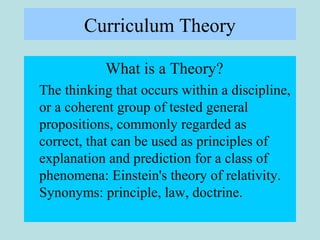
Curriculum theory
- 1. Curriculum Theory What is a Theory? The thinking that occurs within a discipline, or a coherent group of tested general propositions, commonly regarded as correct, that can be used as principles of explanation and prediction for a class of phenomena: Einstein's theory of relativity. Synonyms: principle, law, doctrine.
- 2. George Beauchamp Sources of Theories • Humanities • Natural Sciences • Social Sciences
- 3. Functions of a Theory A. Description • Provides a narrative classification of knowledge in a particular discipline • Interprets the complex activities of a discipline
- 4. Functions of a Theory B. Prediction can predict the occurrence of as yet unobserved events on the basis of explanatory principles imbedded within it
- 5. Functions of a Theory C. Explanation addresses the “why” question - not only points out the relationship between phenomena but suggest the reasons for the relationships
- 6. Functions of a Theory D. Explanation serves as a guide - helps researchers choose data for analysis - theory generated guides further investigation
- 7. Curriculum Theory Early Theory Franklin Bobbitt’s The Curriculum (1918) as the starting point of theorizing in curriculum Emphasized “looking for truth in curriculum”
- 8. Early Theory Harold Rugg NSSE forums to discuss pertinent ideas of curriculum design (1926) NSSE Yearbook (1927) acknowledged fundamental differences in the curriculum field & searched for new bases of professional commonality
- 9. Early Theory John Dewey tried to show the relationship between schools and society linked knowledge in the curriculum to human experiences attempted to test curriculum theory in the schools
- 10. Early Theory Most curricularists who dominated the 20’s & 30’s were child-centered and were not interested in formulating theory
- 11. Mid-Century (1940-1970) Mauritz Johnson presented a model not a theory distinguished between curriculum plan and process of plan discussed differences between curriculum, instruction & teacher behavior
- 12. Mid-Century (1940-1970) Ralph Tyler (1949) emphasis on behavioral/learner objectives sources of curriculum: learners subject specialists contemporary life psychology philosophy
- 13. Mid-Century (1940-1970) James B. MacDonald pointed out major components of schooling: curriculum, instruction, teaching & learning and the interactions of these components. later opposed the behavioristic approach to curriculum
- 14. Current Curriculum Era Michael Apple, Elliot Eisner, William Pinar addressing place of schools in our society; preparing students for an unknown future relevance of student needs
- 15. Theoretical Camps Traditionalists more concerned with practical matters than with theory - interested in curriculum planning & implementation tend to be behaviorists educational practice is science not an art
- 16. Theoretical Camps Conceptual Empiricists often in social science and view primary mission as engaging in research that will be theory producing question why teachers are teaching what they are teaching and why they have arranged the content in the ways they have
- 17. Theoretical Camps Reconstructionists or Reconceptualists Focus on the individual - who controls the schools? - what is the purpose of schooling? How do we liberate schools from the political & economic establishment?
- 18. Aims, Goals & Objectives Education must be purposeful - It must have a direction Most General = Aims Most Specific = Objectives
- 19. Aims, Goals & Objectives Aims - General Statements that provide both shape and direction to the more specific actions of the curriculum “building worldmindedness”
- 20. Aims, Goals & Objectives Ralph Tyler 1. Developing self-realization 2. Making individuals literate, encouraging social mobility 3. Providing skills & understanding necessary for productive employment 4. Furnishing tools requisite for making effective choices 5. Furnishing tools necessary for continued learning
- 21. Sources of Aims Herbert Spencer’s Report (1859) “What knowledge is of most worthy?” 1. Direct self-preservation 2. Indirect self-preservation 3. Parenthood 4. Citizenship 5. Leisure activities
- 22. Sources of Aims Cardinal Principles - NEA (1918) 1. Health 2. Command of Fundamental Processes 3. Worthy Home Membership 4. Vocational Education 5. Civic Education 6. Worthy use of Leasure 7. Ethical Character
- 23. Sources of Aims NEA Educational Policies Commission (1944) Saleable skills Good health & physical fitness Rights and duties of citizens Understanding significance of family Knowledge of how to purchase goods Understanding methods of science
- 24. Sources of Aims Development of capacities to appreciate beauty in art, literature & music Use of leisure time Respect for other persons Ability to think rationally NEA Educational Policies Commission (1961) After Sputnik - stressed intellectual excellence & thinking capacities
- 25. Sources of Aims Nation at Risk (1983) Focused on need for higher standards & expectations by having more rigorous standards Concern with excellence reflects changing “aims” of education
- 26. No Child Left Behind (2001) • High Stakes Testing • Emphasis on Content • Closing Achievement Gap • Annual Yearly Progress
- 27. Goals of Education Goals are statements of purpose Goals are specific statements designed as guidelines to achieve particular purpose “Students will become aware of the various nations of the world and the roles they play in a world community.”
- 28. Objectives Objectives indicate in more specific terms the outcomes of the curriculum Behavioral Objectives - objectives stated precisely will improve the quality of teaching and learning A meaningful objective must be measurable
- 29. Objectives “Students will be able to describe the countries on the Asian continent and be able to provide five examples of products these countries export to the United States.”
- 30. Objectives Robert Mager Objectives must describe 1) behavior of learner; 2) conditions; 3) proficiency level Biggest advantage is the clarity of communication they foster